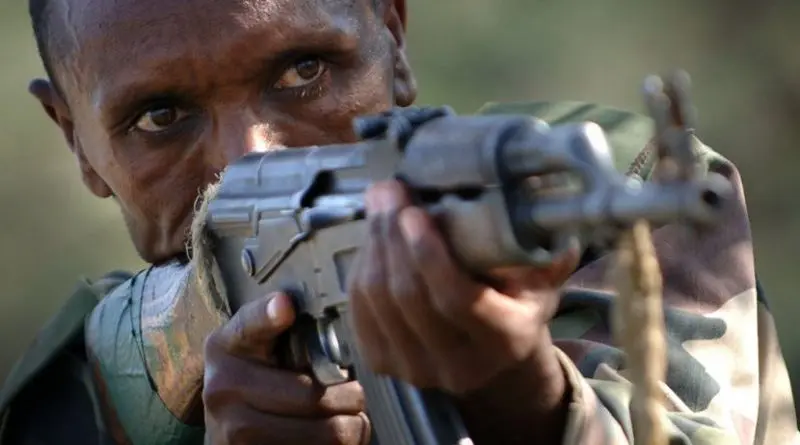Eritrea is kept through iron fists. It is the rule of one man since 1993, the year of its independence from Ethiopia that probably maintained the peace and stability of the country, which is basically force. Similarly Djibouti despite flare ups from time to time is also held through another iron hand.
Further afield in South Sudan and Sudan, civil wars continue, which fragments them more and more. The region of the Horn of Africa States is, indeed, a hotbed of rebellions and terror groups imported from beyond the region by forces, which thrive in the chaos of the region, and assisted by a self-centered political class.
The wars of the region kill many people, culling the populations, and displace many millions more either within the region or flight to other countries. No wonder the Europeans and other countries are now unable to handle the huge of influx of migrant populations from the Horn of Africa and other countries, which they cannot cater for.
It is said in many quarters that colonial Europe and other western countries have always been behind the civil wars, coups and counter coups in the African continent. The birth of politicians who abhor new migrations into their countries in the West is no more crywolfing but genuine for they cannot cater for large influxes of populations into their countries. Perhaps the easy way out is for them to stop their political compatriots in their countries, who are involved in instigating wars, in other countries. The blame of the victims alone as usual, is no longer possible.
And worse are many African countries, which thrive on the plight of their neighbors, and who are reported to participate directly or indirectly in the continuation of the conflicts in other African countries. Somalia is a perfect example of countries, which suffers much from the interference of other countries in the neighborhood and so are Sudan and South Sudan. African countries like Uganda, Kenya, and to some extent, Ethiopia, indeed, thrive on the sufferings of the populations of the Horn of Africa and further afield in South Sudan and Sudan.
Many NGOs with fat administrations who only exist, because of created and maintained conflicts in the region, are based in Kenya and Uganda. Both countries are the passageways for millions of migrant populations and flow of funds to and from the conflicted countries.
In general, the complex Horn of Africa States region is plagued by four main factors – foreign interventions, local expansionist ideas and, indeed, the NGOs that thrive on the chaos and sufferings that follow, and an inefficient and corrupt political class.
Ethiopia’s current pronounced expansionist policy to become a coastal country is a major conflict and security hazard and interventions from further afield from major powers to middle and regional powers add to the complex array of foreign inspired conflicts, including terrorism and radicalism, which derail any semblance of peace, whenever attempts are made in that direction.
Ethiopia simply forgets or is probably being prodded by foreign agendas to ignore the best viable path for a better access and usage of the seas of the region. This obviously lies in diplomacy, good neighborliness and economic cooperation of the region. That would have enabled it to contribute meaningfully to the creation of a regional platform, which would have enabled the countries of the region together to face off others who have interest in the region, be it major powers or other countries in the form of alliances or single states.
A robust regional platform and economic arrangements would perform much better and would be a better solution than territorial expansion. Ethiopia should simply go back to its history and Somalia and how Somalia lost its way on almost the same agenda but in the reverse. The case of Somalia claiming the Somali state of Ethiopia and others was even more justifiable than Ethiopia’s idea of taking any of the territories of the neighboring coastal countries, to have access to a sea through force or otherwise.
The long-term interest of the region lies in cooperation but not in continued conflicts both within each state and with other states. Perhaps a replacement of the IGAD organization through a Horn of Africa States platform would be a more viable proposition. IGAD is an organization, which houses other countries which are prime members of the older African regional organization – The East Africa Community. No country can have a divided loyalty. Somalia wrongly joined the EAC, but Somalis know that this was only driven through an ill-advised and badly managed process.
The inability of the Horn of Africa States region (Somalia, Ethiopia, Eritrea, Djibouti, and Sudan) to launch a viable HAS platform probably contributed to Somalia joining the EAC with which Somalis share very little compared to the HAS region with which it shares history, geography, people, and complementary economic infrastructures
It is only through collaborative works, which will enable the region to stabilize, addressing economic development, which the region needs badly to employ the bulging youthful population of the region (over two hundred million). The political class of the region needs to revisit its books and redress/redraw its strategies. Local expansionist ideas, foreign interventions and foreign NGOs will not save the region from the continuing chaos and fragilities. Centralizing power among a select few, tribe, or clan is ineffective as well, as is employing force and intimidation.
The political class should come back to their senses and win the hearts of their populations, working together through a regional platform, and instilling peace in the region. It is the better way forward.






